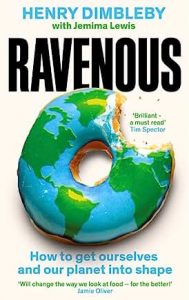One of my long weekend reads (alongside a detective novel – Death Before Evensong – and Metamorphosis, amazing memoir by Richard Douglas-Fairhurst about his diagnosis with MS) was Henry Dimbleby’s Ravenous: How to get ourselves and our planet into shape. The three sections cover health, nature, and what to do. Much of the material it covers is in his terrific Food Strategy document, which the government commissioned and ignored. But here it is written in compelling manner – this is an excellent and anger-inducing read. In short, the food system is making us obese and diabetic (because processing food is so profitable and is under-regulated), massively contributing to global warming, the depletion of biodiversity and other environmental harms (fertilizer use, red meat eating), lacks resilience to shocks (including because of near-monoculture production), and is inhumane to animals and birds that are industrially farmed and processed.
The food strategy has many sensible recommendations, reproduced here, including the use of taxes to cut the use of sugar and salt, more free school meals, changing the approach to farm subsidies and land use, and starting to tackle the UK’s unhealthy food culture. It is not an easy task though because there are several policy aims and some trade-offs. The aims: better health, greater equality of nutrition in an unequal society, more nature-friendly farming and food trade/consumption, improved food security, better treatment of farmed creatures. For instance one implication of several of these is that food prices should be higher – but this works against reducing food inequality and shifting the British diet to a healthier mix. So while some policies are no-brainers (tax sugar in food processing!) others are less obvious.
The first chapter starts with obesity as a system outcome rather than a failure of individual willpower. Not the ideal read as one tucks into an Easter egg (where lack of willpower definitely comes into play). Still, I hope the book makes some impact – not least shaming the government into action despite the lobbying by the food industry.

